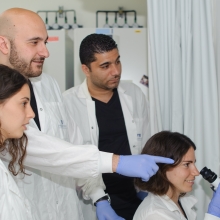MIT-Weizmann collaboration
Major gift by Sagol family will support key research avenues
Briefs

The Sagol family of Israel has made a generous philanthropic gift to support a series of multidisciplinary collaborations between the Weizmann Institute of Science and the Massachusetts Institute of Technology across all areas of science.
This gift, says Mr. Sami Sagol, “will not only seed joint research between these two great institutions. I would like this to be the starting point to seed scientific collaborations between the Sagol Neuroscience Network in Israel and scientists in Massachusetts, another major hub of scientific activity.” He hopes others will follow his lead, he says “so that Israel develops a deeper connection with Massachusetts and—when we’re done with that, the sky’s the limit.”
The gift was announced at MIT during the Global Gathering of the Weizmann Institute, held in Boston in June. The event is held every two years in a different city and brings together Institute donors and friends.
The program entails competitively awarded grants to support research collaborations between pairs (or teams) of faculty from the Weizmann Institute and MIT. The Weizmann Institute and MIT will establish a scientific committee consisting of members of both institutions, and which will issue a call for research proposals. In addition, leadership at both institutions will actively solicit proposals in promising areas identified in consultation with the local faculty at the Weizmann Institute and at MIT.
“We hope this gift will jumpstart new opportunities for excellent collaborative work and we are deeply grateful that the Sagols have made this important step, and in doing so inspire others to invest in the future of scientific collaboration between Israeli and American scientists at the basic research level,” says Prof. Daniel Zajfman, President of the Weizmann Institute.
A history of collaboration
The Weizmann Institute and MIT have shared a history in joint research in computer science, as well as shared faculty. Collaborations began in the 1970s and led to groundbreaking work in the fields of cryptography, computer science, complexity and algorithm theory, and computational biology.
In the late 1970s, Weizmann’s Prof. Adi Shamir—then a researcher at MIT—together with MIT’s Ronald Rivest and Leonard Adleman, developed the RSA encryption algorithm, which made so-called Public-Key Encryptions useful in practice. The discovery showed that a message could be easily encoded, sent to a recipient, and decoded with little chance of it being decoded by a third party who sees it—thereby protecting the secrecy of electronic commerce from piracy and encoding information so it is accessible only to particular users. It has become the basis of almost all Internet-based commercial transactions including online banking. The three scientists were awarded the A.M. Turing Award, the highest award in computer science, for this breakthrough in 2002.
The Weizmann Institute’s Prof. Shimon Ullman received his PhD in electrical engineering from MIT and became a member of its Artificial Intelligence Laboratory (1973-1983). From 1982 to 1986, he had a joint appointment as Associate Professor at MIT and the Weizmann Institute. He returned to the Weizmann full-time in 1986, and has continued close collaborations with his MIT colleagues over the course of more than three decades.
Prof. Shafrira Goldwasser did her postdoctoral studies in computer science at MIT and for many years held a joint appointment on the Weizmann Institute and MIT faculties of computer science before moving to the University of California at Berkeley in 2018. She founded the Cryptography and Information Security Group at MIT. For her work in cryptography she received the Turing Award in 2013.
About the donors
The Sagol family is deeply engaged in advancing scientific research and strengthening Israel’s position as a major hub in brain science and longevity. Among other activities, the family established the Sagol Neuroscience and Longevity Network, a series of 12 centers at eight Israeli institutions doing research and clinical care in brain science, aging, and longevity. Their most recent gift to the Weizmann Institute was the Sagol Institute for Longevity Research, in 2017. The Sagol family established Keter Plastics in 1948 and transformed it from a small worshop in Jaffa into a world-leading industrial group in home-improvement consumer products. Sami Sagol is a member of the Institute’s International Board and received an honorary doctorate from the Institute in 2016. The couple resides in Tel Aviv.







